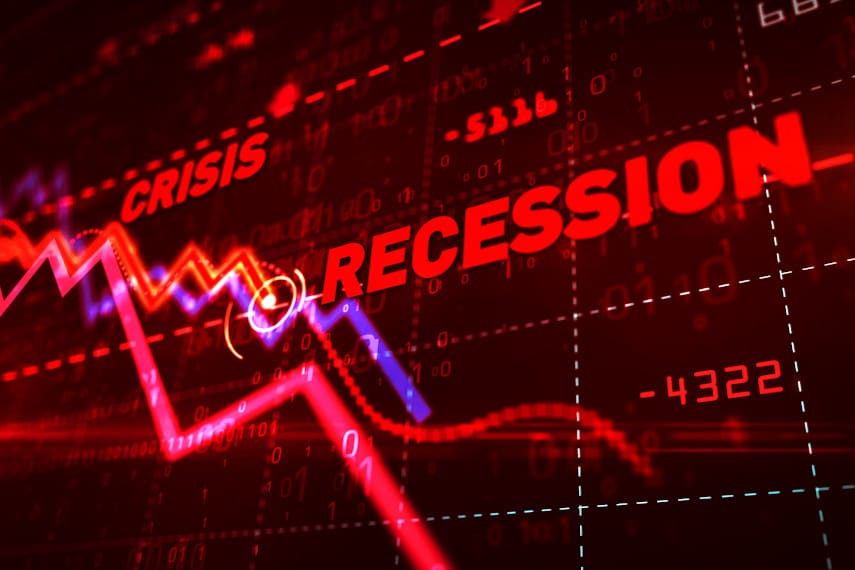3 Words You’ll Never Hear Anyone in Washington Say
There are three words you’ll never hear come out of the mouth of anyone in a position of power in Washington, DC In fact, these three words are so difficult to say that it’s likely there are more...
Economy

One of the hallmarks of stock market euphoria is the growing belief that markets can’t possibly ever go down. When the good times roll, millions of people think that they’ll keep rolling forever. But inevitably, what goes up must also come down.
We’ve seen the boom-bust cycle in stock markets play out numerous times over the years. 1929 remains the archetypal example of a stock market crash, with massive stock market losses on Black Thursday, Black Monday, and Black Tuesday. After rallies over the next year, stock markets began a long, steady slide, with final losses ending up at nearly 90% by the time markets reached their nadir in 1932.
Most recently in our time we’ve seen the dotcom bubble crashing in 2000. While markets themselves didn’t see nearly the same losses as in 1929, many individual stocks completely lost their value, as high-flying tech stocks quickly became worthless.
The 2008 financial crisis saw broader losses, as markets lost nearly 55% of their value between their peak in 2007 and their trough in 2009. And the next crisis could make any of these previous crises look tame in comparison.
Many veteran investors, particularly those older professional investors who have been around for decades, are warning that the euphoria we’re seeing today exceeds even that seen during the dotcom bubble. Undoubtedly most people today probably don’t realize that, and think that things are just fine. But their complacency could cost them dearly when markets finally correct.
You may often hear those around you remarking that every correction in stock markets today is a buying opportunity. “Buy the dip” has become a mantra for many. But just as stock markets didn’t immediately plummet to worthlessness in 1929, so too will the next crisis likely take some time to materialize.
Bear market rallies are a thing, and they buoy the confidence of those who want to believe that markets have reached permanently high plateaus. But in the end they provide little more than false confidence in the staying power of markets.
Market tops are often only seen in hindsight. It can take months for trends to become evident even to those willing to look for them, and to the general public who don’t pay rapt attention to markets, it could take even longer. It could take markets dropping 20, 30, or even 40% before most people begin to sit up and take notice. But by then the majority of the damage has already been done.
If you have assets that are tied up in stock markets and financial markets, you’ll want to protect them in advance of a crash. While trying to time the right time to make investment decisions can be difficult, there are three major factors right now that could indicate that a crash is coming soon.
Right now many people think that stock markets are doing really well since they’re not too far off their all-time highs. But the headline index numbers ignore the fact that stock markets are completely unbalanced.
For instance, last week the Nasdaq index saw 12 stocks that hit 52-week highs, whereas it had 585 stocks that hit 52-week lows. That means that stock market indexes are being driven by a handful of large, highly hyped stocks, while the rest of the market is performing poorly.
Much of the performance of stock markets over the past several years has been like that, with the FAANG stocks making up an outsized portion of stock market gains while other stocks stagnate or lose value. It’s only a matter of time before those highly hyped tech stocks fall back to earth, and when they do, they’ll take markets down with them.
The risk to most investors is that they may be highly invested in those big tech stocks. Many technology-oriented funds pile the majority of their money into Google, Facebook, Tesla, Amazon, and other big tech players. When their stock prices finally come back to earth, many investors could get burned.
The rate of selling of shares by corporate insiders has increased to record levels this year, as the corporate bigwigs want to get out while the getting’s good. Many understand that stocks are overvalued and overpriced, so they’re looking for their payday before markets tank. But how many ordinary investors see what’s going on?
Retail investors are still buying stocks while insiders and professional investors are divesting themselves as quickly as they can. Many people watching this from the sidelines have a bad feeling about what’s about to happen, as unsophisticated newbies are flocking to stocks, just like they did before the crashes in 1929 and 2000.
These new investors have only ever seen stock markets go up, and have no memories of previous crashes. So once markets start to turn south, they could be in for a world of hurt.
Cryptocurrencies have been a hot topic for the past 4-5 years, especially among younger people. Some think of cryptocurrencies as a way to get rich quick, others think of it as a hedge against financial uncertainty, much like gold, and still others think of it as an investment asset that can replace stocks.
But much like stock markets, cryptocurrency markets are being flooded with new and inexperienced investors. A recent survey found that over half of all Bitcoin holders only got into Bitcoin this year. That’s another worrying sign that investment markets are being flooded with money from new investors who don’t know what they’re doing and are only following the herd.
That flood of new and inexperienced investors is a common theme in every late stage of a bubble that’s about to burst. So the fact that these new investors are entering markets for all sorts of assets should set alarm bells ringing.
If you’re seeing these warning signs and realize that a crash is imminent, you’re probably wondering how you can protect your wealth, if you haven’t already. You’re not alone. Millions of Americans are just like you, worried about what the future holds but uncertain of how they’re going to protect the savings and investments they’ve worked so hard to acquire.
Thankfully there are numerous options available to you, including alternative assets such as precious metals. Precious metals such as gold and silver have been used by investors for decades to help protect and maintain their wealth through periods of financial uncertainty and economic turbulence.
Gold and silver often not only maintain their value when other assets lose value, but gain value in the face of economic headwinds. During the 1970s, for instance, gold and silver grew at annualized rates of more than 30% over the course of the decade, despite a lackluster stock market and inflation that reached double digits. And in the aftermath of the 2008 financial crisis, gold nearly tripled in price while silver more than quintupled.
Gold and silver can also form part of a diversified investment portfolio, especially if you have existing tax-advantaged retirement accounts such as a 401(k), 403(b), IRA, TSP or similar account. With a precious metals IRA you can roll over or transfer assets from your existing retirement accounts into a gold or silver investment tax-free. By investing through a gold IRA or silver IRA, you can invest in physical gold and silver coins or bars while still enjoying the same tax advantages that you already have with your existing retirement accounts.
Alternatively, you could buy gold and silver coins to store safely at home, offering you the security of a physical asset that’s in your possession, the ability to benefit from future gains in the gold price and silver price, and the opportunity to own an asset whose value won’t get eaten away by rising inflation.
These are interesting times we’re living in, and no one knows what will happen next year, let alone in 5-10 years. Everything we thought we knew has been turned on its head, uncertainty is increasing, and everyone is becoming more and more anxious about the future.
With all signs pointing to a likely future crash, maybe it’s time to put some of your uncertainty and anxiety to rest with gold and silver. Call the precious metals experts at Goldco today to learn more about how gold and silver can benefit you.



